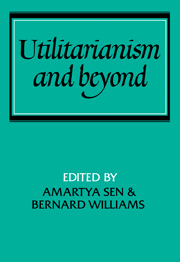Book contents
- Frontmatter
- Contents
- Preface
- Introduction: Utilitarianism and beyond
- 1 Ethical theory and utilitarianism
- 2 Morality and the theory of rational behaviour
- 3 The economic uses of utilitarianism
- 4 Utilitarianism, uncertainty and information
- 5 Contractualism and utilitarianism
- 6 The diversity of goods
- 7 Morality and convention
- 8 Social unity and primary goods
- 9 On some difficulties of the utilitarian economist
- 10 Utilitarianism, information and rights
- 11 Sour grapes – utilitarianism and the genesis of wants
- 12 Liberty and welfare
- 13 Under which descriptions?
- 14 What's the use of going to school?
- Bibliography
4 - Utilitarianism, uncertainty and information
Published online by Cambridge University Press: 30 January 2010
- Frontmatter
- Contents
- Preface
- Introduction: Utilitarianism and beyond
- 1 Ethical theory and utilitarianism
- 2 Morality and the theory of rational behaviour
- 3 The economic uses of utilitarianism
- 4 Utilitarianism, uncertainty and information
- 5 Contractualism and utilitarianism
- 6 The diversity of goods
- 7 Morality and convention
- 8 Social unity and primary goods
- 9 On some difficulties of the utilitarian economist
- 10 Utilitarianism, information and rights
- 11 Sour grapes – utilitarianism and the genesis of wants
- 12 Liberty and welfare
- 13 Under which descriptions?
- 14 What's the use of going to school?
- Bibliography
Summary
Introduction
It is no accident that a large number of the essays in this volume are by economists, since they appear to have made far more use of utilitarianism than have other social scientists. Indeed, the whole study of welfare economics is founded more or less explicitly on utilitarian ideas, even when economists deal only with the idea of Pareto efficiency – when no individual can be made better off without making someone else worse off. In addition, economists appear to have come face to face with a number of challenging issues in applying what amounts to utilitarian techniques to specific economic problems. Examples of such issues are changing tastes, the valuation of life and limb, uncertainty, and incompletely informed individuals. Perhaps one may say that it has almost become one of the hallmarks of a good economist to try to extend the basic utilitarian framework of welfare economics to treat such issues.
In this essay I am going to present an almost entirely verbal and relatively non-technical discussion of the problems which arise in trying to extend utilitarianism to deal with such issues. My concern will be to try to see what questions utilitarianism can be extended to handle sucessfully, and what questions cause great difficulty. Because I am an economist, the ethical issues I shall be discussing will mostly be at least closely related to economic issues, i.e. the problem of allocating scarce resources, and the associated question of the proper distribution of income.
Information
- Type
- Chapter
- Information
- Utilitarianism and Beyond , pp. 85 - 102Publisher: Cambridge University PressPrint publication year: 1982
Accessibility standard: Unknown
Why this information is here
This section outlines the accessibility features of this content - including support for screen readers, full keyboard navigation and high-contrast display options. This may not be relevant for you.Accessibility Information
- 2
- Cited by
